被动语态复习
图片预览

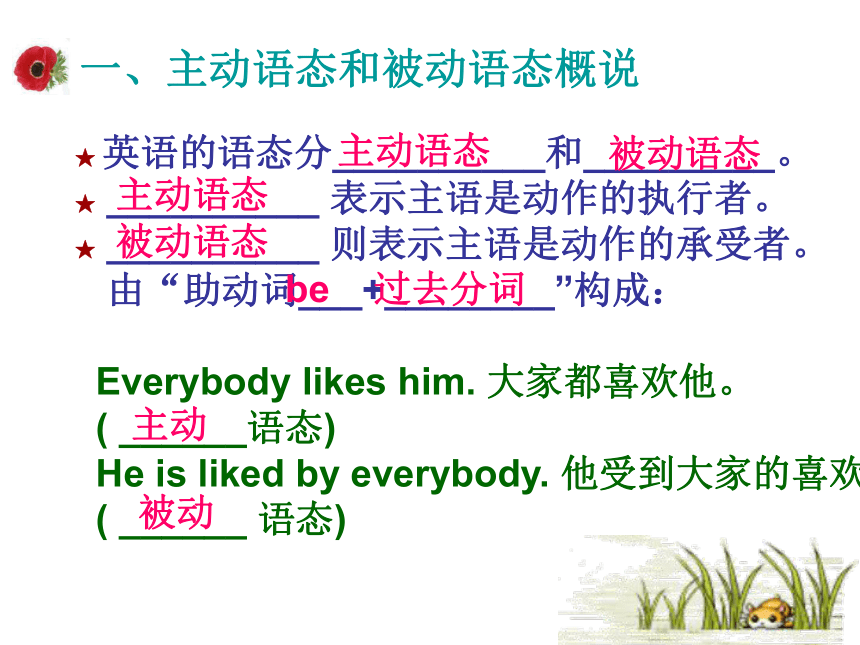
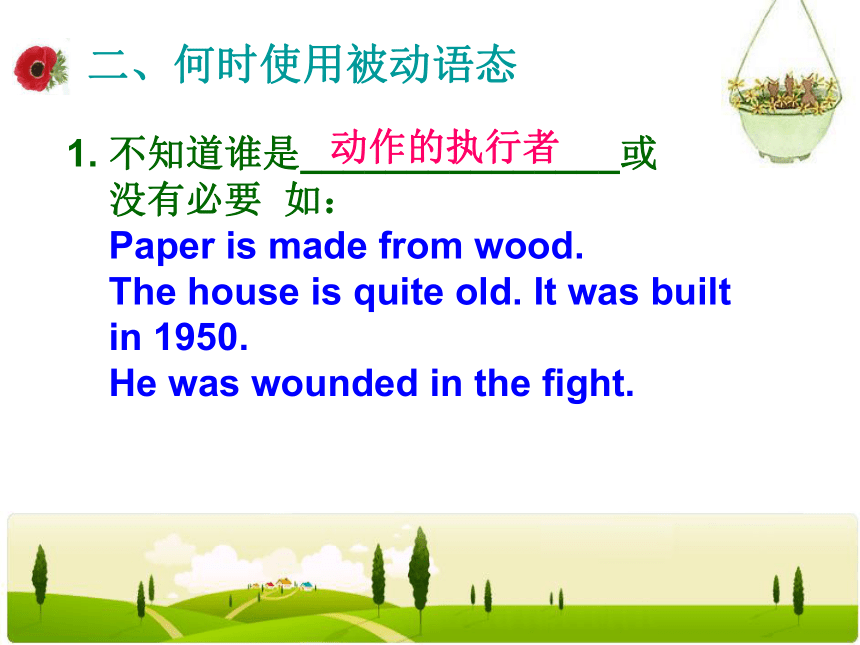
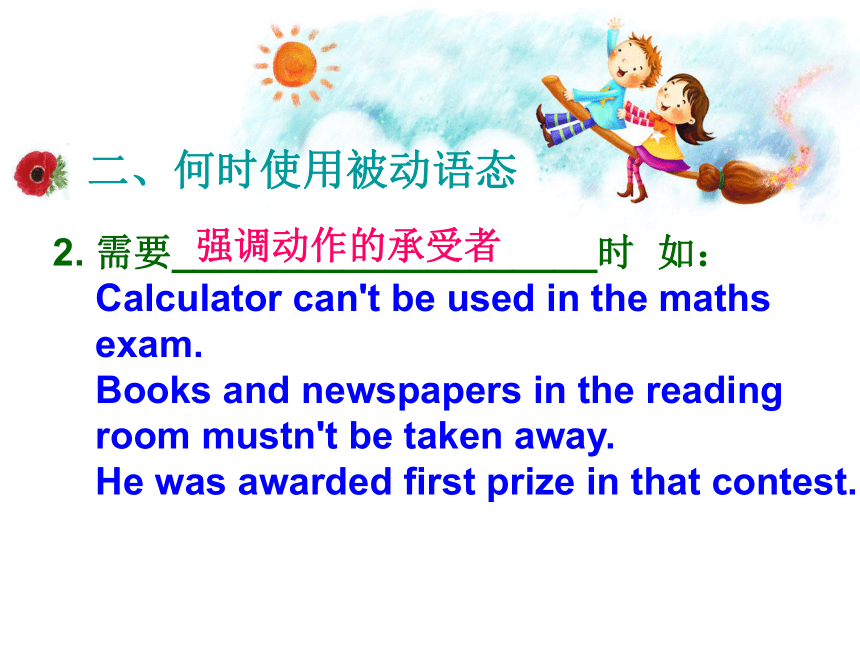
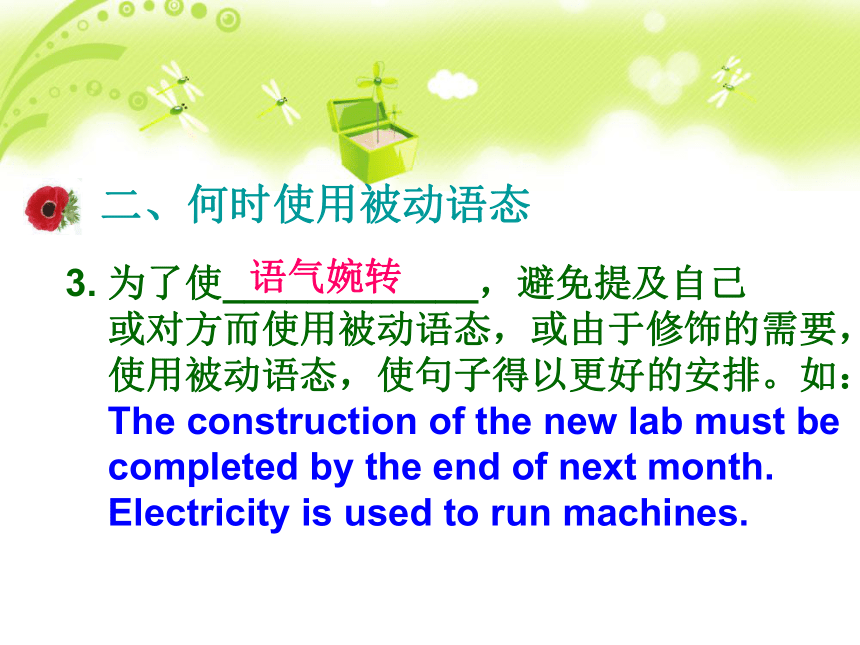
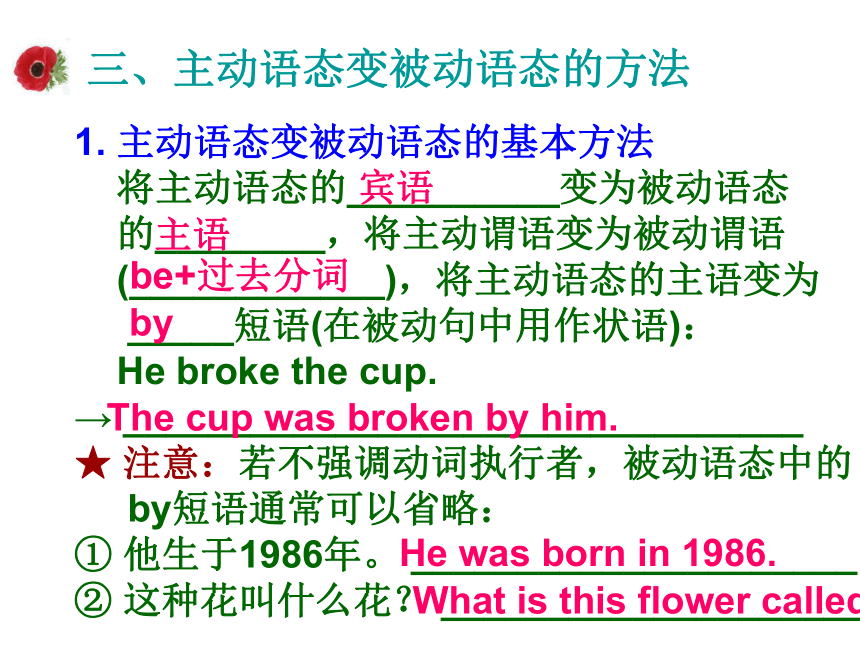
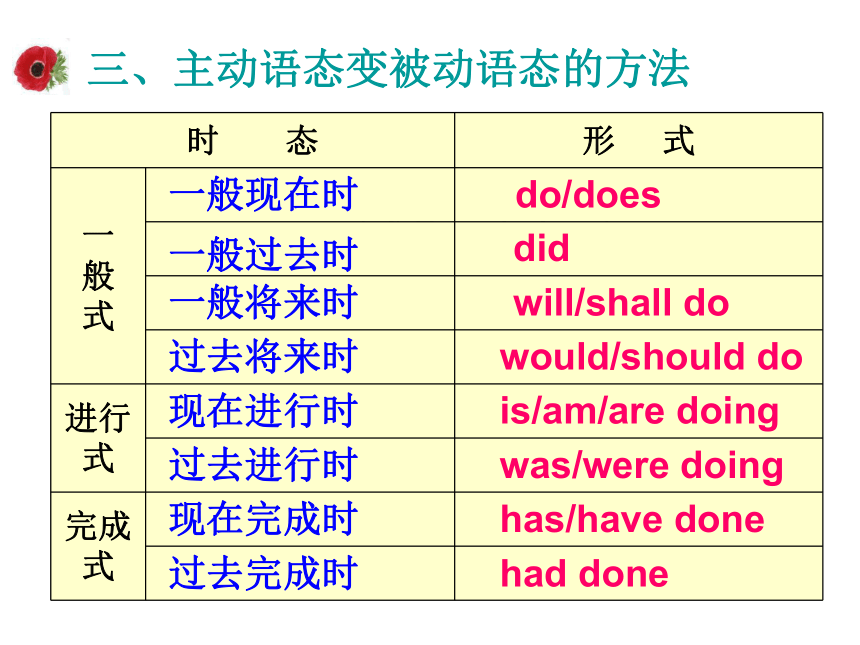

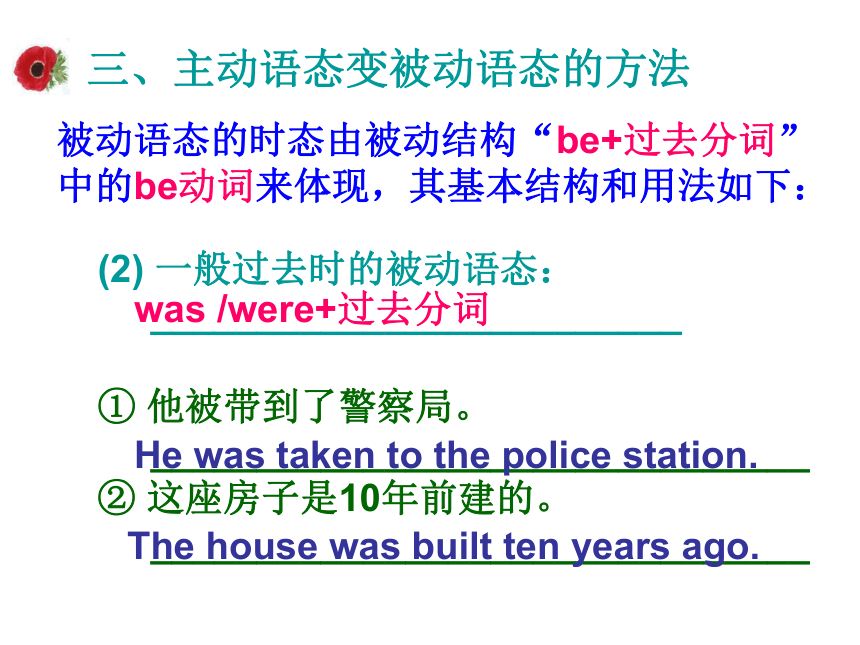
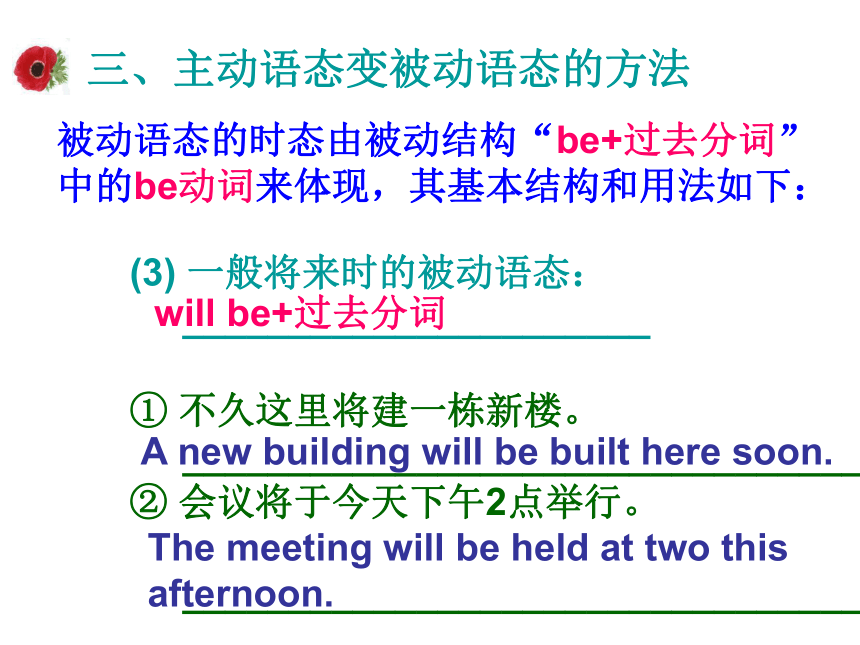


文档简介
课件39张PPT。被动语态的用法 ★ 基本用法★ 特殊用法★ 英语的语态分__________和_________。
★ __________ 表示主语是动作的执行者。
★ __________ 则表示主语是动作的承受者。
由“助动词___+________”构成:
Everybody likes him. 大家都喜欢他。
( ______语态)
He is liked by everybody. 他受到大家的喜欢。
( ______ 语态) 一、主动语态和被动语态概说主动语态 被动语态 主动语态 被动语态 be 过去分词 主动 被动 二、何时使用被动语态1. 不知道谁是_______________或
没有必要??如:
Paper is made from wood.??
The house is quite old. It was built
in 1950.??
He was wounded in the fight.? 动作的执行者 二、何时使用被动语态2. 需要____________________时??如:
Calculator can't be used in the maths
exam.??
Books and newspapers in the reading room mustn't be taken away.??
He was awarded first prize in that contest.? 强调动作的承受者 二、何时使用被动语态3. 为了使____________,避免提及自己
或对方而使用被动语态,或由于修饰的需要,
使用被动语态,使句子得以更好的安排。如:
The construction of the new lab must be completed by the end of next month.??
Electricity is used to run machines.?? 语气婉转 二、何时使用被动语态三、主动语态变被动语态的方法 1. 主动语态变被动语态的基本方法
将主动语态的__________变为被动语态
的________,将主动谓语变为被动谓语
(____________),将主动语态的主语变为
_____短语(在被动句中用作状语):
He broke the cup.
→ ________________________________
★ 注意:若不强调动词执行者,被动语态中的
by短语通常可以省略:
① 他生于1986年。 _____________________
② 这种花叫什么花? ____________________宾语 主语 be+过去分词 by The cup was broken by him. He was born in 1986. What is this flower called? 三、主动语态变被动语态的方法 2. 被动语态的时态
★ 时态回顾:(时态主要以谓语动词的不同
形式体现出来。)一般现在时 do/does 一般过去时 did一般将来时 过去将来时 will/shall dowould/should do现在进行时 is/am/are doingwas/were doing过去进行时 现在完成时 has/have done过去完成时 had done三、主动语态变被动语态的方法 被动语态的时态由被动结构“be+过去分词”
中的be动词来体现,其基本结构和用法如下:(1) 一般现在时的被动语态:
_________________________
① 我们学校学英语。
________________________________
② 我们在学校受到很好的照顾。
________________________________ am /is/ are+过去分词 English is taught in our school. We are taken good care of at school. 三、主动语态变被动语态的方法 被动语态的时态由被动结构“be+过去分词”
中的be动词来体现,其基本结构和用法如下:(2) 一般过去时的被动语态:
_________________________
① 他被带到了警察局。
_______________________________
② 这座房子是10年前建的。
_______________________________was /were+过去分词 He was taken to the police station. The house was built ten years ago. 三、主动语态变被动语态的方法 被动语态的时态由被动结构“be+过去分词”
中的be动词来体现,其基本结构和用法如下:(3) 一般将来时的被动语态:
______________________
① 不久这里将建一栋新楼。
_________________________________
② 会议将于今天下午2点举行。
_________________________________A new building will be built here soon. will be+过去分词 The meeting will be held at two this
afternoon. 三、主动语态变被动语态的方法 被动语态的时态由被动结构“be+过去分词”
中的be动词来体现,其基本结构和用法如下:(4) 过去将来时的被动语态:
_____________________
① 他说会议将于下周举于。
_______________________________would be+过去分词 He said that the meeting would be
held the next week. 三、主动语态变被动语态的方法 被动语态的时态由被动结构“be+过去分词”
中的be动词来体现,其基本结构和用法如下:(5) 现在完成时的被动语态:
________________________
① 所有的工作现在都做好了。
______________________________
② 信都寄了吗?
______________________________ have /has been+过去分词 All the work has been done now. Have the letters been posted? 三、主动语态变被动语态的方法 被动语态的时态由被动结构“be+过去分词”
中的be动词来体现,其基本结构和用法如下:(6) 过去完成时的被动语态:
________________________
① 他说工作已完成了。
_______________________________ had been+过去分词 He said the work had been finished. 三、主动语态变被动语态的方法 被动语态的时态由被动结构“be+过去分词”
中的be动词来体现,其基本结构和用法如下:(7) 现在进行时的被动语态:
_________________________
① 我的表正在由他修理。
_______________________________
② 计划现在正在讨论。
_______________________________am /is/ are being+过去分词 My watch is being repaired by him. The plan is now being discussed. 三、主动语态变被动语态的方法 被动语态的时态由被动结构“be+过去分词”
中的be动词来体现,其基本结构和用法如下:(8) 过去进行时的被动语态:
_______________________
① 他说那个人正在动手术。
_______________________________
② 他说正在修建一个新车站。
_______________________________was /were being+过去分词 He said that the man was being
operated on. He told me that a new station was
being built. 三、主动语态变被动语态的方法 被动语态的时态由被动结构“be+过去分词”
中的be动词来体现,其基本结构和用法如下:3. 含有情态动词的被动形式
若主动语态中谓语含有情态动词,在相应
的被动语态中通常应保留该情态动词,其
结构为“_______________________”:
① Everyone must know this.
________________________________情态动词+be+过去分词 This must be known by everyone. 三、主动语态变被动语态的方法 被动语态的时态由被动结构“be+过去分词”
中的be动词来体现,其基本结构和用法如下:请看以下带情态动词被动句实例:
② 这不是短期内可以完成的。
________________________________
③ 这可以由机器来做吗?
________________________________
④ 这工作必须马上做了。
________________________________This can’t be done in a short time. Can this be done by machine? The work must be done at once. 练习 1. They will reprint the book soon.
________________________________
2. They can not find him.??
_________________________________
3. The rabbits will eat the carrots.
_________________________________
4. They have set up a power station in their
home town.
_________________________________ The book will be reprinted soon.He can not be found by them.The carrots will be eaten by the rabbits.A power station has been set up in ….练习 5. I often play basketball on Sundays.
__________________________________
6. The Russian businessman will buy the famous painting by Xu Beihong.
__________________________________
7. They had build three ships by last December.
__________________________________Basketball is often played by me on ….The famous painting by Xu Beihong will
be bought by the Russian businessman.Three ships had been built by last ….练习 8. We shall build several big modern power
plants in our city next year.
___________________________________
9. The workers are repairing the main
building of the school
___________________________________.Several big modern power plants shall
be built in our city next year.The main building of the school is being
repaired by the workers.练习 10. The teacher will mark the students’
homework tonight.
__________________________________ 11. Somebody had cleaned my shoes.?
__________________________________
The students’ homework will be marked
by the teacher tonight.My shoes had been cleaned by some….四、其它用法 —— 1. 带双宾语的动词,它们在变为被动语态 时,通常是把___________(指___ )变 为被动语态的主语,而把___________ (指______)保留下来(称为保留宾语):
① He answered me that question. _________________________________带双宾语的动词 I was answered that question by him. 间接宾语 人 直接宾语 物 四、其它用法 ——★ 有的动词则通常把______宾语(指物) 变为被动语态的主语,而把______宾语 改为介词to 或for引起的状语 (到底用to 还是for与所搭配的动词有关):
② He wrote her a letter.
______________________________. (与动词write搭配用介词_____)
③ She made him a new coat.
______________________________.
(与动词make搭配用介词_____)直接 间接 A letter was written to her. to A new coat was made for him. for 带双宾语的动词四、其它用法 ——带双宾语的动词★ 有时以上两种方式均可用:
④ He gave her some money.
_____________________________. _____________________________.
⑤ He bought her a watch.
_____________________________.
_____________________________.She was given some money (by him). Some money was given to her. A watch was bought for her. She was bought a watch. 四、其它用法 ——带双宾语的动词● 练习
1. He showed me his pictures.?? _________________________________.
_________________________________.??
2. Aunt made me a new dress.?? _________________________________.
_________________________________.
3. He sent me a birthday present.?? _________________________________.
_________________________________.I was shown his pictures by him. His pictures were shown to me by him. I was made a new dress by aunt.? A new dress was made for me by aunt. I was sent a birthday present by him.?? A birthday present was sent to me by him.? 四、其它用法 ——含复合宾语的动词★ 2.含有复合宾语的主动句,宾补不变。 (1)将宾语变为主语,宾补不变。??如:
① They call her XiaoLi.??
____________________________????
??? ② He left the door open.???????
? ____________________________She is called XiaoLi.The door was left open by him.?四、其它用法 ——含复合宾语的动词★(2) make, let, have, hear, watch, see, feel,
notice, help等动词后接不定式做宾补一般
不加to,但变为被动时,必须加to。??如:
③ My brother often made me do this and that when I was young.?? _______________________________________
when I young.??
④ I heard her move about in her room upstairs
last night.?? ______________________________ last night.??
⑤ Did you see Jack take away the magazine??? ______________________________________? I was often made to do this and that by my ….She was heard to move about in … Was Jack seen to take away the magazine 四、其它用法 ——动词短语的被动语态? 一般来讲,只有_____动词才有被动语态,
因为只有vt. 才能有动作的承受者; 但有许多由
_____________+______及其他词类构成的短
语动词,相当与及物动词,可以有宾语。因而
可以有被动语态,但应注意动词短语是一个不
可分割的整体。变被动时,不可丢掉构成短语
的______或______这样的短语有:look after,
listen to, look at, pay attention to, take care
of, look forward to, make use of, etc.??如:
e.g. We should take good care of all the old
people. 及物 不及物动词 介词 介词 副词 四、其它用法 ——动词短语的被动语态? ① They had put out the fire before the
fire-brigade arrived.?? _________________________________? ② They will set up a new public school
here.?? _________________________________?? The fire had been put out before the
fire-brigade arrived. A new public school will be set up here. 四、其它用法 4. 许多动词如_______, _________, ______,
________, 既可以用做______,(表示状态)
也可以在被动语态结构中做________。(表
动作),句中如果有介词____,通常是被动语态。??如: worried brokeninterestedshut形容词 过去分词 by I was worried about you all night. (表______)?? I was worried by mosquitoes all night. (表_____)?? The glass was broken by Jack. (表______)?? The glass is broken. (表______ )?? I was frightened by his ghost story.?? (表______ )? She was frightened at the sight of a snake.??
(表______ )? 状态 状态 动作 动作 动作 状态 四、其它用法 —— 5. 主动形式表被动?? 主动形式表被动?? ⑴ 一些表示感受、感官的连系动词如:
look, sound, smell, feel, taste 等主
语是物时,可用主动表被动:
① 这座建筑看上去很美.
_______________________________ ② 她的声音听起来非常甜美. _______________________________ The building looks very beautiful. Her voice sounded quite sweet. 四、其它用法 —— 主动形式表被动?? ⑶ 不定式be to blame (for sth.) (应该受责
备, 对某坏事应负责任 ), be to rent(出租)
作表语时,主动形式表被动含义?。 ① 他该受到责备。
____________________________
② 哪位司机要对这次事故负责?
____________________________Which driver was to blame for the
accident? He is to blame. 四、其它用法 —— 主动形式表被动?? ⑷ 表(sth.)需要的need ,want, require等
后的v-ing 用主动形式表被动含义。
这房间需要清洁。
_________________________________? The room needs/wants/requires cleaning.? ⑸ be??worth后的v-ing主动形式表被动含义。
这本书值得读。
_________________________________ The book is worth reading.? 四、其它用法 —— 主动句中的宾语是从句?6. 主动语态中的宾语是从句,变成被动时使
用形式替代词 it.??如:
① We know that Britain is an island country.??
_________________________________?
② The teacher said that this book has been
translated into several languages.
?? _________________________________? It's known that Britain is an island country.? It's said that this book has been translated
into several languages. 四、其它用法 7. 在一些固句型中常用被动语态结构如:
It is said that … 据说…,人们说…
It is reported that … 据报道…
It is hoped that … 人们希望… It is well known that… 众所周知…
It is believed that… 人们相信…
It must be admitted that… 必须承认…
It must be pointed that… 必须指出的是… 一般人都相信健康重于财富。 It is believed that health is above wealth. 四、其它用法 8. 谓语动词是以下时,无被动。?如:? happen, belong to, suit, fit(适合), have,
let, join, fall, last(延长),cost(花费)??
break out(爆发)appear, lack(缺乏),
hold(容纳), burst out(迸发),
agree with(同意)。? 牢房里发生斗殴。
______________________________ Fighting broke out in the prison cells. 五、练习 1. Our English teacher often uses a tape
-recorder in teaching English.
__________________________________
2. The villagers gave the foreign guests
warm welcome.
__________________________________
3. They heard someone singing in the next
room. __________________________________A tape-recorder is often used (by our
English teacher) in teaching English. The foreign guests were given a warm
welcome by the villagers. Someone was heard singing in the next... 五、练习 4. The trees should be watered every day. __________________________________
5. We must take good care of the children. _________________________________
6. The firefighters have put out the big fire. __________________________________We should water the trees every day. The children must be taken good care of . The big fire has been put out . 五、练习 7. 这房子属于我。 _______________________________
8. 这音乐听起来很悦耳。 _______________________________
9. 这种笔在那个国家很好销。 _______________________________ This room belongs to me. This music sounds sweet. This pen sells well in that country.
★ __________ 表示主语是动作的执行者。
★ __________ 则表示主语是动作的承受者。
由“助动词___+________”构成:
Everybody likes him. 大家都喜欢他。
( ______语态)
He is liked by everybody. 他受到大家的喜欢。
( ______ 语态) 一、主动语态和被动语态概说主动语态 被动语态 主动语态 被动语态 be 过去分词 主动 被动 二、何时使用被动语态1. 不知道谁是_______________或
没有必要??如:
Paper is made from wood.??
The house is quite old. It was built
in 1950.??
He was wounded in the fight.? 动作的执行者 二、何时使用被动语态2. 需要____________________时??如:
Calculator can't be used in the maths
exam.??
Books and newspapers in the reading room mustn't be taken away.??
He was awarded first prize in that contest.? 强调动作的承受者 二、何时使用被动语态3. 为了使____________,避免提及自己
或对方而使用被动语态,或由于修饰的需要,
使用被动语态,使句子得以更好的安排。如:
The construction of the new lab must be completed by the end of next month.??
Electricity is used to run machines.?? 语气婉转 二、何时使用被动语态三、主动语态变被动语态的方法 1. 主动语态变被动语态的基本方法
将主动语态的__________变为被动语态
的________,将主动谓语变为被动谓语
(____________),将主动语态的主语变为
_____短语(在被动句中用作状语):
He broke the cup.
→ ________________________________
★ 注意:若不强调动词执行者,被动语态中的
by短语通常可以省略:
① 他生于1986年。 _____________________
② 这种花叫什么花? ____________________宾语 主语 be+过去分词 by The cup was broken by him. He was born in 1986. What is this flower called? 三、主动语态变被动语态的方法 2. 被动语态的时态
★ 时态回顾:(时态主要以谓语动词的不同
形式体现出来。)一般现在时 do/does 一般过去时 did一般将来时 过去将来时 will/shall dowould/should do现在进行时 is/am/are doingwas/were doing过去进行时 现在完成时 has/have done过去完成时 had done三、主动语态变被动语态的方法 被动语态的时态由被动结构“be+过去分词”
中的be动词来体现,其基本结构和用法如下:(1) 一般现在时的被动语态:
_________________________
① 我们学校学英语。
________________________________
② 我们在学校受到很好的照顾。
________________________________ am /is/ are+过去分词 English is taught in our school. We are taken good care of at school. 三、主动语态变被动语态的方法 被动语态的时态由被动结构“be+过去分词”
中的be动词来体现,其基本结构和用法如下:(2) 一般过去时的被动语态:
_________________________
① 他被带到了警察局。
_______________________________
② 这座房子是10年前建的。
_______________________________was /were+过去分词 He was taken to the police station. The house was built ten years ago. 三、主动语态变被动语态的方法 被动语态的时态由被动结构“be+过去分词”
中的be动词来体现,其基本结构和用法如下:(3) 一般将来时的被动语态:
______________________
① 不久这里将建一栋新楼。
_________________________________
② 会议将于今天下午2点举行。
_________________________________A new building will be built here soon. will be+过去分词 The meeting will be held at two this
afternoon. 三、主动语态变被动语态的方法 被动语态的时态由被动结构“be+过去分词”
中的be动词来体现,其基本结构和用法如下:(4) 过去将来时的被动语态:
_____________________
① 他说会议将于下周举于。
_______________________________would be+过去分词 He said that the meeting would be
held the next week. 三、主动语态变被动语态的方法 被动语态的时态由被动结构“be+过去分词”
中的be动词来体现,其基本结构和用法如下:(5) 现在完成时的被动语态:
________________________
① 所有的工作现在都做好了。
______________________________
② 信都寄了吗?
______________________________ have /has been+过去分词 All the work has been done now. Have the letters been posted? 三、主动语态变被动语态的方法 被动语态的时态由被动结构“be+过去分词”
中的be动词来体现,其基本结构和用法如下:(6) 过去完成时的被动语态:
________________________
① 他说工作已完成了。
_______________________________ had been+过去分词 He said the work had been finished. 三、主动语态变被动语态的方法 被动语态的时态由被动结构“be+过去分词”
中的be动词来体现,其基本结构和用法如下:(7) 现在进行时的被动语态:
_________________________
① 我的表正在由他修理。
_______________________________
② 计划现在正在讨论。
_______________________________am /is/ are being+过去分词 My watch is being repaired by him. The plan is now being discussed. 三、主动语态变被动语态的方法 被动语态的时态由被动结构“be+过去分词”
中的be动词来体现,其基本结构和用法如下:(8) 过去进行时的被动语态:
_______________________
① 他说那个人正在动手术。
_______________________________
② 他说正在修建一个新车站。
_______________________________was /were being+过去分词 He said that the man was being
operated on. He told me that a new station was
being built. 三、主动语态变被动语态的方法 被动语态的时态由被动结构“be+过去分词”
中的be动词来体现,其基本结构和用法如下:3. 含有情态动词的被动形式
若主动语态中谓语含有情态动词,在相应
的被动语态中通常应保留该情态动词,其
结构为“_______________________”:
① Everyone must know this.
________________________________情态动词+be+过去分词 This must be known by everyone. 三、主动语态变被动语态的方法 被动语态的时态由被动结构“be+过去分词”
中的be动词来体现,其基本结构和用法如下:请看以下带情态动词被动句实例:
② 这不是短期内可以完成的。
________________________________
③ 这可以由机器来做吗?
________________________________
④ 这工作必须马上做了。
________________________________This can’t be done in a short time. Can this be done by machine? The work must be done at once. 练习 1. They will reprint the book soon.
________________________________
2. They can not find him.??
_________________________________
3. The rabbits will eat the carrots.
_________________________________
4. They have set up a power station in their
home town.
_________________________________ The book will be reprinted soon.He can not be found by them.The carrots will be eaten by the rabbits.A power station has been set up in ….练习 5. I often play basketball on Sundays.
__________________________________
6. The Russian businessman will buy the famous painting by Xu Beihong.
__________________________________
7. They had build three ships by last December.
__________________________________Basketball is often played by me on ….The famous painting by Xu Beihong will
be bought by the Russian businessman.Three ships had been built by last ….练习 8. We shall build several big modern power
plants in our city next year.
___________________________________
9. The workers are repairing the main
building of the school
___________________________________.Several big modern power plants shall
be built in our city next year.The main building of the school is being
repaired by the workers.练习 10. The teacher will mark the students’
homework tonight.
__________________________________ 11. Somebody had cleaned my shoes.?
__________________________________
The students’ homework will be marked
by the teacher tonight.My shoes had been cleaned by some….四、其它用法 —— 1. 带双宾语的动词,它们在变为被动语态 时,通常是把___________(指___ )变 为被动语态的主语,而把___________ (指______)保留下来(称为保留宾语):
① He answered me that question. _________________________________带双宾语的动词 I was answered that question by him. 间接宾语 人 直接宾语 物 四、其它用法 ——★ 有的动词则通常把______宾语(指物) 变为被动语态的主语,而把______宾语 改为介词to 或for引起的状语 (到底用to 还是for与所搭配的动词有关):
② He wrote her a letter.
______________________________. (与动词write搭配用介词_____)
③ She made him a new coat.
______________________________.
(与动词make搭配用介词_____)直接 间接 A letter was written to her. to A new coat was made for him. for 带双宾语的动词四、其它用法 ——带双宾语的动词★ 有时以上两种方式均可用:
④ He gave her some money.
_____________________________. _____________________________.
⑤ He bought her a watch.
_____________________________.
_____________________________.She was given some money (by him). Some money was given to her. A watch was bought for her. She was bought a watch. 四、其它用法 ——带双宾语的动词● 练习
1. He showed me his pictures.?? _________________________________.
_________________________________.??
2. Aunt made me a new dress.?? _________________________________.
_________________________________.
3. He sent me a birthday present.?? _________________________________.
_________________________________.I was shown his pictures by him. His pictures were shown to me by him. I was made a new dress by aunt.? A new dress was made for me by aunt. I was sent a birthday present by him.?? A birthday present was sent to me by him.? 四、其它用法 ——含复合宾语的动词★ 2.含有复合宾语的主动句,宾补不变。 (1)将宾语变为主语,宾补不变。??如:
① They call her XiaoLi.??
____________________________????
??? ② He left the door open.???????
? ____________________________She is called XiaoLi.The door was left open by him.?四、其它用法 ——含复合宾语的动词★(2) make, let, have, hear, watch, see, feel,
notice, help等动词后接不定式做宾补一般
不加to,但变为被动时,必须加to。??如:
③ My brother often made me do this and that when I was young.?? _______________________________________
when I young.??
④ I heard her move about in her room upstairs
last night.?? ______________________________ last night.??
⑤ Did you see Jack take away the magazine??? ______________________________________? I was often made to do this and that by my ….She was heard to move about in … Was Jack seen to take away the magazine 四、其它用法 ——动词短语的被动语态? 一般来讲,只有_____动词才有被动语态,
因为只有vt. 才能有动作的承受者; 但有许多由
_____________+______及其他词类构成的短
语动词,相当与及物动词,可以有宾语。因而
可以有被动语态,但应注意动词短语是一个不
可分割的整体。变被动时,不可丢掉构成短语
的______或______这样的短语有:look after,
listen to, look at, pay attention to, take care
of, look forward to, make use of, etc.??如:
e.g. We should take good care of all the old
people. 及物 不及物动词 介词 介词 副词 四、其它用法 ——动词短语的被动语态? ① They had put out the fire before the
fire-brigade arrived.?? _________________________________? ② They will set up a new public school
here.?? _________________________________?? The fire had been put out before the
fire-brigade arrived. A new public school will be set up here. 四、其它用法 4. 许多动词如_______, _________, ______,
________, 既可以用做______,(表示状态)
也可以在被动语态结构中做________。(表
动作),句中如果有介词____,通常是被动语态。??如: worried brokeninterestedshut形容词 过去分词 by I was worried about you all night. (表______)?? I was worried by mosquitoes all night. (表_____)?? The glass was broken by Jack. (表______)?? The glass is broken. (表______ )?? I was frightened by his ghost story.?? (表______ )? She was frightened at the sight of a snake.??
(表______ )? 状态 状态 动作 动作 动作 状态 四、其它用法 —— 5. 主动形式表被动?? 主动形式表被动?? ⑴ 一些表示感受、感官的连系动词如:
look, sound, smell, feel, taste 等主
语是物时,可用主动表被动:
① 这座建筑看上去很美.
_______________________________ ② 她的声音听起来非常甜美. _______________________________ The building looks very beautiful. Her voice sounded quite sweet. 四、其它用法 —— 主动形式表被动?? ⑶ 不定式be to blame (for sth.) (应该受责
备, 对某坏事应负责任 ), be to rent(出租)
作表语时,主动形式表被动含义?。 ① 他该受到责备。
____________________________
② 哪位司机要对这次事故负责?
____________________________Which driver was to blame for the
accident? He is to blame. 四、其它用法 —— 主动形式表被动?? ⑷ 表(sth.)需要的need ,want, require等
后的v-ing 用主动形式表被动含义。
这房间需要清洁。
_________________________________? The room needs/wants/requires cleaning.? ⑸ be??worth后的v-ing主动形式表被动含义。
这本书值得读。
_________________________________ The book is worth reading.? 四、其它用法 —— 主动句中的宾语是从句?6. 主动语态中的宾语是从句,变成被动时使
用形式替代词 it.??如:
① We know that Britain is an island country.??
_________________________________?
② The teacher said that this book has been
translated into several languages.
?? _________________________________? It's known that Britain is an island country.? It's said that this book has been translated
into several languages. 四、其它用法 7. 在一些固句型中常用被动语态结构如:
It is said that … 据说…,人们说…
It is reported that … 据报道…
It is hoped that … 人们希望… It is well known that… 众所周知…
It is believed that… 人们相信…
It must be admitted that… 必须承认…
It must be pointed that… 必须指出的是… 一般人都相信健康重于财富。 It is believed that health is above wealth. 四、其它用法 8. 谓语动词是以下时,无被动。?如:? happen, belong to, suit, fit(适合), have,
let, join, fall, last(延长),cost(花费)??
break out(爆发)appear, lack(缺乏),
hold(容纳), burst out(迸发),
agree with(同意)。? 牢房里发生斗殴。
______________________________ Fighting broke out in the prison cells. 五、练习 1. Our English teacher often uses a tape
-recorder in teaching English.
__________________________________
2. The villagers gave the foreign guests
warm welcome.
__________________________________
3. They heard someone singing in the next
room. __________________________________A tape-recorder is often used (by our
English teacher) in teaching English. The foreign guests were given a warm
welcome by the villagers. Someone was heard singing in the next... 五、练习 4. The trees should be watered every day. __________________________________
5. We must take good care of the children. _________________________________
6. The firefighters have put out the big fire. __________________________________We should water the trees every day. The children must be taken good care of . The big fire has been put out . 五、练习 7. 这房子属于我。 _______________________________
8. 这音乐听起来很悦耳。 _______________________________
9. 这种笔在那个国家很好销。 _______________________________ This room belongs to me. This music sounds sweet. This pen sells well in that country.
